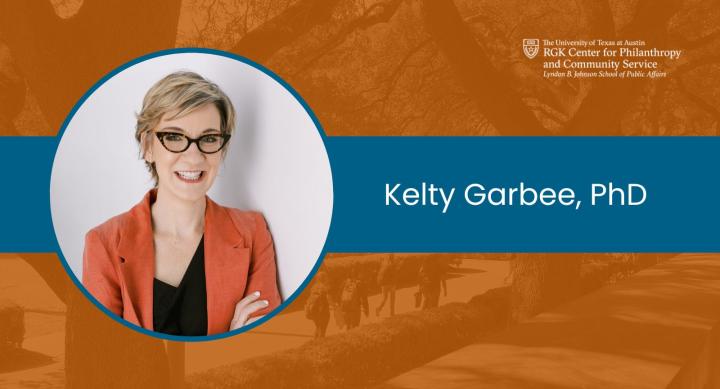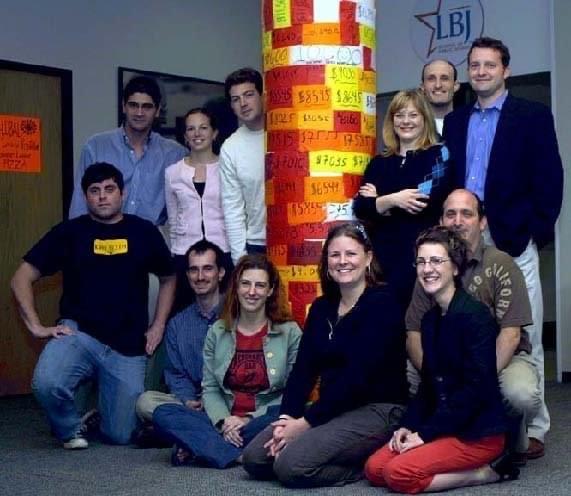
Kelty Garbee's passion for rural communities shines as she tells the story of a West Texas school superintendent she met while working at the Texas Education Agency. He answered his phone one day at 5:00 p.m. to a parent telling him that her child would not be in school the next day. “I don’t want you all to waste time driving down our long road, so can you let the bus driver know?” the parent had asked. Happy to oblige, the superintendent quickly notified the bus driver to save them a few minutes on the way to school the next morning.
“That would never happen in a larger area,” Garbee says. “But the focus on relationships is just there. Yes, there are challenges, but it’s about creating the time and space for people to think creatively, listening to what people need, and bringing in resources.”
An alum of the LBJ School of Public Affairs, Kelty Garbee now serves as the Executive Director of Texas Rural Funders. She uses her passion for relationship building and the skills she gained through the LBJ School and the Nonprofit Studies portfolio to foster collaboration among funders and bring support to leaders in rural Texas communities.
According to Texas Rural Funders, rural land makes up 85% of the state of Texas. Though much of the state depends on rural counties for “food, fiber, and fuel,” these areas often fall behind their urban counterparts in measures of long-term wellbeing. About half of the school districts in the state are considered rural, and in at least 129 Texas counties, less than 50% of residents have access to broadband (source).
“There are big assets in these areas you want to maintain, but in order to do that you need to have healthy rural communities where people can live and work,” said Garbee, who grew up in rural Virginia.
Garbee explains that Texas Rural Funders plays the unique role of convening state-wide and regional funders to "talk about rural.” The organization provides a space to collaborate and build trust with rural communities who can share experiences and opportunities in their area – all while fostering two-way learning between funders and rural leaders.
“Particularly in rural communities, it’s really meaningful when people show up,” Garbee said. “Understanding what the needs are and connecting people to information and resources they can use in their communities is a really an important part of the relationship.”
Garbee began working with the Texas Education Agency after graduating from the LBJ School, managing the early college high school program. She began noticing that smaller, more rural school districts sometimes had challenges meeting the requirements set in TEA’s model for opening early college high schools. A superintendent in a rural school district would call Garbee each time the agency opened grant applications, informing her that they had interest in starting an early college high school but didn’t have enough people to meet the 400-student requirement.
“One of the things she forced me to think about was the fact that the grant requirements and the processes you - as a funder, state agency, or policy maker - are putting in place may exclude a specific community or have unintended consequences,” said Garbee.
Listening to the lived experiences of people impacted by these policies gave Garbee the justification she needed to convince colleagues within the agency to develop a small and rural planning grant, which eventually produced several rural early college high schools. After every grant cycle, Garbee explains, her team sought feedback from the community about improvements or challenges in the process and would incorporate those innovations back up at the systems level.
“We set aside some of our preconceived notions about what size you needed to be or the number of students you needed to serve," said Garbee. “We, as a funder and state agency, had to shift our thinking to be more accommodating.”
After working for the TEA for five years, Garbee switched over to a role at Educate Texas, which was created as a public-private-partnership under the umbrella of Communities Foundation of Texas. While TEA gave her an opportunity to apply the policy knowledge she gained at the LBJ School, Garbee says, her background and heart was in philanthropy. Working under the umbrella of a foundation at Educate Texas added a new facet to her work.
“I think a lot of people start at the LBJ School wanting to work in D.C. or in a state capitol, but there’s an ecosystem that goes behind that,” said Garbee. “Fundraising provides resources to power organizations.”

Garbee first got involved with Texas Rural Funders when the organization was an all-volunteer initiative, then later applied for the founding Executive Director position. This role, she says, allows her to combine her passions for rural communities and philanthropy.
“I truly believe that thriving rural communities are critical to the success of Texas,” said Garbee.
Last legislative session, Texas Rural Funders co-founded a policy coalition called Digital Texas , which includes United Ways of Texas, Texas 2036, and the Greater Houston Partnership. The coalition’s focus during the session was passing HB5, which successfully established a Texas broadband office and broadband plan. In the current session, Garbee and others are advocating for underserved rural communities so they can take advantage of the influx of federal funding for broadband access.
“We are focused on identifying and elevating the needs of rural communities, telling their stories, and making sure they don’t get left out of the policy discussions,” said Garbee.
Texas Rural Funders is working with organizations like United Ways of Texas and the Texas State Library and Archives Commission to share information among their networks about upcoming bills or other opportunities that would affect rural broadband access.
Garbee also serves on the Texas Nonprofit Council, one of up to twelve nonprofit leaders appointed by the governor to provide front-line perspective and insight to state agencies.
“When I think about policy, I look at it through the lens of nonprofit organizations,” Garbee says. “In order to create the best policies, you need people in the field, and that includes nonprofit organizations that are doing the work and translating policy into practice.”